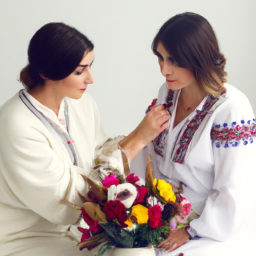Marriage is a sacred institution that brings two individuals together, binding them in a lifelong commitment. It is a union that transcends borders, cultures, and traditions, often resulting in a beautiful blend of diverse backgrounds. However, navigating the intricate path of marriage can become even more challenging when cultural differences come into play. In this blog post, we will delve into the fascinating realm of marriage and cultural differences, exploring the unique dynamics, joys, and complexities that arise when two people from distinct cultural backgrounds decide to join their lives together. Whether you are currently in a multicultural marriage, considering entering one, or simply curious about the topic, this post aims to shed light on the intricacies of this beautiful journey.
The Impact of Cultural Differences on Intercultural Marriages
Intercultural marriages, also known as cross-cultural or mixed marriages, are becoming increasingly common in our globalized world. These unions bring together individuals from different cultural backgrounds, often leading to a rich and diverse relationship. However, navigating the complexities of cultural differences can also present unique challenges. In this article, we will explore the impact of cultural differences on intercultural marriages and provide a step-by-step guide on how to navigate these challenges.
Understanding Cultural Differences
Culture encompasses a wide range of elements, including language, beliefs, values, customs, traditions, and social norms. When two individuals from different cultural backgrounds come together in marriage, these differences can significantly influence their relationship dynamics. It is crucial to recognize that no culture is superior or inferior to another; they are simply different, with their own unique strengths and weaknesses.
One of the first steps in navigating cultural differences in an intercultural marriage is to develop a deep understanding of each other’s cultural backgrounds. This involves actively engaging in open and honest conversations about your respective cultures, traditions, and values. Take the time to learn about each other’s customs, celebrations, and social etiquette. This mutual understanding will lay the foundation for a stronger and more harmonious relationship.
It is also important to be aware of potential stereotypes or biases that may exist towards each other’s cultures. These biases can often be subconscious, but they can still impact the dynamics of your relationship. By acknowledging and challenging these biases, you can create a more inclusive and respectful environment within your marriage.
Communication and Language
Effective communication is the cornerstone of any successful marriage, and this holds even more true in intercultural unions. Language barriers can pose significant challenges, as partners may have different levels of fluency or speak different languages altogether. It is essential to establish clear and open lines of communication, ensuring that both partners feel heard and understood.
If language differences exist, consider learning each other’s languages or finding a common language that you can both communicate in comfortably. This not only facilitates better communication but also shows a willingness to embrace each other’s cultures. Additionally, be patient and understanding with each other’s language abilities, as mastering a new language takes time and effort.
Non-verbal communication is also an important aspect to consider. Different cultures may have varying norms regarding gestures, eye contact, personal space, and body language. Educate yourself about these cultural nuances to avoid misunderstandings and misinterpretations. Remember, what may be considered appropriate in one culture may not hold the same meaning in another.
Resolving Conflict and Finding Common Ground
Conflict is a natural part of any relationship, and intercultural marriages are no exception. However, cultural differences can sometimes exacerbate conflicts or make them more challenging to resolve. It is crucial to approach conflicts with empathy, respect, and a willingness to find common ground.
When conflicts arise, take the time to understand each other’s perspectives and cultural influences that may be contributing to the issue. This requires active listening and a genuine effort to see the situation from your partner’s point of view. Remember, cultural differences can shape our values and beliefs, and what may seem obvious or logical to one person may not be the same for the other.
Seeking professional help, such as couples therapy or counseling, can also be beneficial in navigating conflicts in an intercultural marriage. A trained professional can provide guidance and tools to help you communicate effectively, manage differences, and strengthen your relationship.
Furthermore, finding common ground and shared experiences can help bridge cultural differences and create a stronger bond. Embrace opportunities to participate in each other’s cultural celebrations, explore new cuisines, or travel to each other’s home countries. By actively engaging in each other’s cultures, you can foster a deeper understanding and appreciation for your partner’s background.
In conclusion, intercultural marriages can be incredibly enriching and fulfilling, but they also require effort, understanding, and open-mindedness. By embracing and celebrating cultural differences, actively communicating, and finding common ground, you can build a strong foundation for a successful intercultural marriage. Remember, love knows no boundaries, and with the right approach, cultural differences can become a source of strength and unity in your relationship.

Marriage is a beautiful union that brings two individuals together in love and commitment. However, when two people from different cultural backgrounds come together, they may face unique challenges that require understanding, compromise, and open communication. In this article, we will explore the various challenges that couples may encounter in marriages with cultural differences and provide a step-by-step guide to navigate these challenges successfully.
Understanding Cultural Differences
The first step in navigating challenges in marriages with cultural differences is to develop a deep understanding of each other’s cultural backgrounds. This involves learning about traditions, customs, values, and beliefs that shape each partner’s worldview. By gaining knowledge and appreciation for each other’s cultures, couples can foster respect and create a strong foundation for their relationship.
It is essential to engage in open and honest conversations about cultural differences. This means actively listening to each other’s experiences, perspectives, and expectations. By doing so, couples can identify potential areas of conflict and work towards finding common ground. It is important to approach these discussions with empathy and a willingness to learn from one another.
Furthermore, couples should actively seek opportunities to immerse themselves in each other’s cultures. This can include attending cultural events, participating in traditional celebrations, or even learning each other’s languages. By embracing each other’s cultural practices, couples can foster a sense of inclusivity and strengthen their bond.
Addressing Communication Challenges
Effective communication is crucial in any marriage, but it becomes even more vital in marriages with cultural differences. Language barriers, different communication styles, and varying non-verbal cues can all pose challenges to understanding and expressing oneself effectively.
One way to address communication challenges is by establishing clear and open lines of communication. This involves creating a safe space where both partners feel comfortable expressing their thoughts and emotions. It may be helpful to establish ground rules for communication, such as active listening, using “I” statements, and avoiding assumptions or stereotypes.
Additionally, couples can explore alternative forms of communication to bridge any language barriers. This can include using translation tools or learning each other’s languages to facilitate better understanding. Non-verbal cues, such as body language and facial expressions, also play a significant role in communication. Couples should be mindful of these cues and make an effort to interpret them accurately.
Finally, seeking professional help, such as couples therapy or cultural mediation, can be beneficial in addressing communication challenges. A trained professional can provide guidance, tools, and techniques to improve communication and resolve conflicts effectively.
Embracing Flexibility and Compromise
Marriages with cultural differences require flexibility and a willingness to compromise. Each partner brings their own set of beliefs, values, and expectations, which may differ from their spouse’s. It is crucial to acknowledge and respect these differences while finding common ground that aligns with both partners’ needs and desires.
Flexibility involves being open to new experiences, ideas, and ways of doing things. It means letting go of rigidity and embracing the beauty of cultural diversity. Couples can explore and create new traditions that blend elements from both cultures, allowing them to celebrate their unique backgrounds together.
Compromise is also essential in navigating challenges in marriages with cultural differences. It requires finding middle ground and making decisions that consider the needs and desires of both partners. This may involve negotiating cultural practices, family dynamics, and even lifestyle choices. By compromising, couples can create a harmonious and balanced relationship that honors both their individuality and shared values.
In conclusion, navigating challenges in marriages with cultural differences requires understanding, effective communication, and a willingness to embrace flexibility and compromise. By developing a deep understanding of each other’s cultures, addressing communication challenges, and embracing flexibility, couples can build a strong and resilient relationship. Remember, cultural differences can be a source of strength and richness in a marriage if approached with love, respect, and a genuine desire to learn from one another.

3. Celebrating Diversity: Embracing Cultural Differences in Marriage
Marriage is a sacred bond that brings together two individuals from different backgrounds, cultures, and traditions. It is a beautiful union that celebrates love, commitment, and the merging of two lives. However, navigating through cultural differences can be challenging, requiring patience, understanding, and open-mindedness. In this article, we will explore the importance of embracing cultural differences in marriage and provide a step-by-step guide to building a strong and harmonious relationship.
The Value of Cultural Differences in Marriage
Marriage is an opportunity to learn, grow, and expand our horizons. Embracing cultural differences in a marriage allows us to gain a deeper understanding of our partner’s heritage, beliefs, and values. It enriches our lives by exposing us to new traditions, cuisines, languages, and customs. By celebrating diversity, we create a vibrant and inclusive environment that fosters mutual respect, acceptance, and appreciation.
One of the key benefits of embracing cultural differences in marriage is the opportunity for personal growth. It challenges us to step outside our comfort zones and broaden our perspectives. It encourages us to question our own assumptions and biases, fostering personal development and self-awareness. By embracing diversity, we become more adaptable, empathetic, and open to new experiences.
Moreover, cultural differences can strengthen the bond between partners. When both individuals actively engage in learning about each other’s cultures, it creates a sense of unity and shared experiences. It allows for the creation of unique traditions and rituals that reflect the couple’s diverse backgrounds. This shared exploration of cultural differences can deepen the emotional connection and create a strong foundation for the marriage.
Step-by-Step Guide to Embracing Cultural Differences in Marriage
Step 1: Open and Honest Communication
The first step towards embracing cultural differences in marriage is open and honest communication. It is essential to create a safe space where both partners can express their thoughts, feelings, and concerns. Encourage each other to share stories, memories, and experiences related to their cultural backgrounds. Active listening and empathy play a crucial role in understanding and appreciating each other’s perspectives.
It is important to discuss any potential cultural conflicts that may arise in the future. Addressing these issues early on allows for proactive problem-solving and prevents misunderstandings. By openly communicating, couples can establish a foundation of trust and respect, paving the way for a harmonious and inclusive marriage.
Step 2: Cultural Education and Exploration
Embracing cultural differences requires a genuine interest in learning and exploring. Both partners should actively engage in educating themselves about each other’s cultures. This can be done through reading books, watching documentaries, attending cultural events, or even visiting each other’s home countries.
Encourage each other to share traditional recipes, teach language basics, or participate in cultural festivals. By immersing oneself in the partner’s culture, a deeper understanding and appreciation can be developed. This shared exploration can also create beautiful memories and traditions that blend both cultures.
Step 3: Compromise and Flexibility
Successful marriages require compromise and flexibility, especially when it comes to cultural differences. It is important to find a balance that respects both partners’ cultural values and traditions. This may involve adapting certain customs or finding creative ways to merge traditions.
Compromise is not about sacrificing one’s identity or beliefs but finding common ground that honors both individuals. It is a continuous process that requires open-mindedness and a willingness to embrace change. By being flexible, couples can create a harmonious and inclusive environment where both partners feel valued and respected.
In conclusion, embracing cultural differences in marriage is a journey of love, understanding, and growth. It requires open communication, cultural education, and compromise. By celebrating diversity, couples can create a vibrant and inclusive environment that fosters mutual respect and appreciation. Remember, love knows no boundaries, and when two individuals from different cultures come together, they have the opportunity to create a beautiful tapestry of traditions and experiences.
In Summary
Marriage is a sacred institution that brings together two individuals from different backgrounds, cultures, and traditions. While love may conquer all, it is undeniable that cultural differences can pose unique challenges in a marriage. In today’s globalized world, where people from diverse cultures are increasingly intermingling, understanding and navigating these differences becomes paramount for a successful and harmonious union.
Cultural differences can manifest in various aspects of married life, from communication styles and expectations to family dynamics and religious practices. Language barriers, for instance, can hinder effective communication and lead to misunderstandings, requiring couples to develop patience and find alternative means of expressing themselves. Moreover, conflicting values and beliefs rooted in different cultures can create tensions, as each partner may have different ideas about gender roles, parenting, or even the importance of extended family involvement. Successful marriages across cultural boundaries require open-mindedness, empathy, and a willingness to compromise, as couples strive to blend their cultural backgrounds and create a shared identity that respects and integrates both partners’ heritage. By embracing cultural differences, couples can enrich their relationship, broaden their perspectives, and foster a deeper appreciation for diversity.
Q&A Corner:
Q1: What are some common cultural differences that can affect a marriage?
A1: Cultural differences can manifest in various aspects of a marriage. These may include differences in communication styles, values, traditions, religious beliefs, gender roles, family dynamics, and expectations regarding marriage and relationships.
Q2: How can cultural differences impact a marriage?
A2: Cultural differences can both enrich and challenge a marriage. On one hand, they can bring diversity, new perspectives, and a broader understanding of the world. On the other hand, they may lead to misunderstandings, conflicts, and difficulties in finding common ground. It is important for couples to navigate these differences with empathy, respect, and open communication.
Q3: What are some strategies for managing cultural differences in a marriage?
A3: To effectively manage cultural differences in a marriage, couples can employ several strategies. These include fostering open and honest communication, actively listening to each other’s perspectives, seeking to understand and appreciate each other’s cultural backgrounds, compromising and finding common ground, participating in cultural experiences together, and being willing to adapt and learn from one another.
Q4: Can cultural differences lead to conflicts in a marriage?
A4: Yes, cultural differences can sometimes lead to conflicts in a marriage. Conflicts may arise due to differing expectations, values, or ways of expressing emotions. However, conflicts can be resolved through effective communication, mutual respect, and a willingness to understand and accommodate each other’s cultural perspectives.
Q5: Are there any benefits to marrying someone from a different culture?
A5: Marrying someone from a different culture can offer numerous benefits. It provides an opportunity to learn about new traditions, languages, cuisines, and customs. It promotes personal growth, tolerance, and a broader worldview. Additionally, couples in multicultural marriages often develop stronger problem-solving skills, adaptability, and resilience, as they navigate and appreciate the richness of their diverse backgrounds.

About Sarah:
Sarah is a certified marriage counselor and co-founder of SaveOurVows.com. Her expertise lies in helping couples reignite the spark in their relationships and create a lasting bond built on trust and understanding. As a devoted wife and mother, Sarah draws from her personal experiences and professional training to offer valuable guidance to couples seeking to save their marriages. Her articles focus on nurturing emotional connection and fostering a supportive environment where love can thrive.
About John:
John is a relationship expert and co-founder of SaveOurVows.com. With a Master’s degree in Marriage and Family Therapy, John is passionate about helping couples navigate the challenges that come with marriage. Having experienced the highs and lows in his own relationship with Sarah, he understands the complexities of married life and believes in the power of effective communication and emotional intimacy. John’s articles offer practical tips and insights to empower couples in their journey to a stronger and more fulfilling marriage.
Together as a Team:
John and Sarah’s mission is to provide a compassionate and supportive platform for couples in need of guidance and encouragement. Through their collaborative efforts, they aim to inspire love and commitment in marriages worldwide. As a couple themselves, they embody the principles they teach, and their dedication to helping others strengthen their relationships is the driving force behind SaveOurVows.com.
Favorite Topics:
Rekindling Romance: John and Sarah believe that rekindling the romance is an essential aspect of any successful marriage. Their articles on this topic offer creative ideas and practical strategies to keep the passion alive.
Effective Communication: Communication is the foundation of a healthy relationship. John and Sarah share expert tips to improve communication between couples and resolve conflicts constructively.
Building Trust: Trust is paramount in any marriage. Through their articles, they help couples rebuild trust and create a secure and loving environment.
Join Sarah and John’s Journey:
Sarah and John invite you to join them on their journey of empowering couples to save their vows and build lasting and fulfilling marriages. Their insights and advice aim to make a positive impact on your relationship, fostering a bond that stands the test of time.






